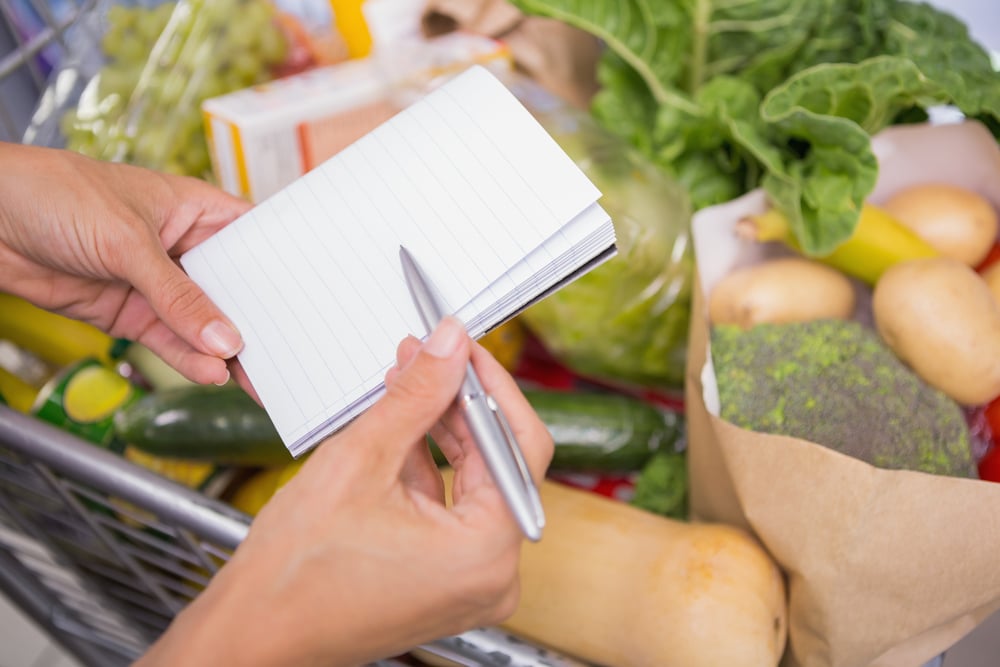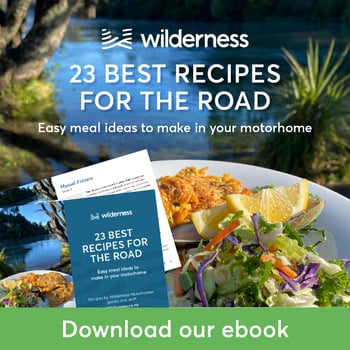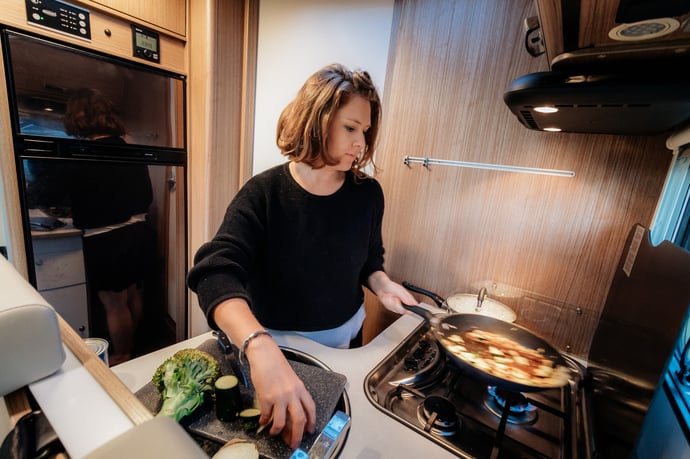
You’ve locked in your campervan hire and begun planning your journey — but you’re fairly new to cooking in a vehicle.
It’s time to start thinking about what you really want to cook on your motorhome adventure. From meal planning and shopping through to using leftovers and keeping your kitchen space tidy — here are our top cooking tips for your campervan road trip.
|
Table of Contents |
The best places to buy food for campervan cooking
Supermarkets near airports or on the outskirts of New Zealand towns usually have parking spaces big enough to accommodate larger vehicles like campervans and motorhomes. If you’re unfamiliar with an area:
- Check out the available car parking on Google Maps, or
- Plan to park on a quiet nearby road.
Shopping at the supermarket
The big commercial grocery stores are ideal for finding those basic food items you’ll need to begin your road trip.
|
💡Supermarket shopping tips
|
Find out how to cook in a campervan the New Zealand way.
Ordering online
Consider ordering your main supermarket shop online prior to collecting your motorhome, then pick up your food supplies on-the-go.
Many of New Zealand’s supermarkets now offer online shopping. Simply create an online account, order the items you need and select a suitable time to collect them. Your groceries will be ready when you arrive.
Take any stress out of your first day of travel by ordering your food up to a week in advance. Click and collect orders are usually packed into paper bags for a small charge, but you won’t have to worry about bringing along your own shopping bags.
Christchurch Airport Woolworths and Auckland Airport Woolworths are great examples as all the major motorhome and campervan brands have depots nearby.
Packing a few staples
Basic food items like salt, sugar and tea bags usually only come in larger packs. It’s unlikely you’ll use them up — especially if you’ve planned a short campervan trip.
Think about bringing a few staples with you in small containers or sealable bags. This way you’ll save time, money and space.
Searching out seasonal produce
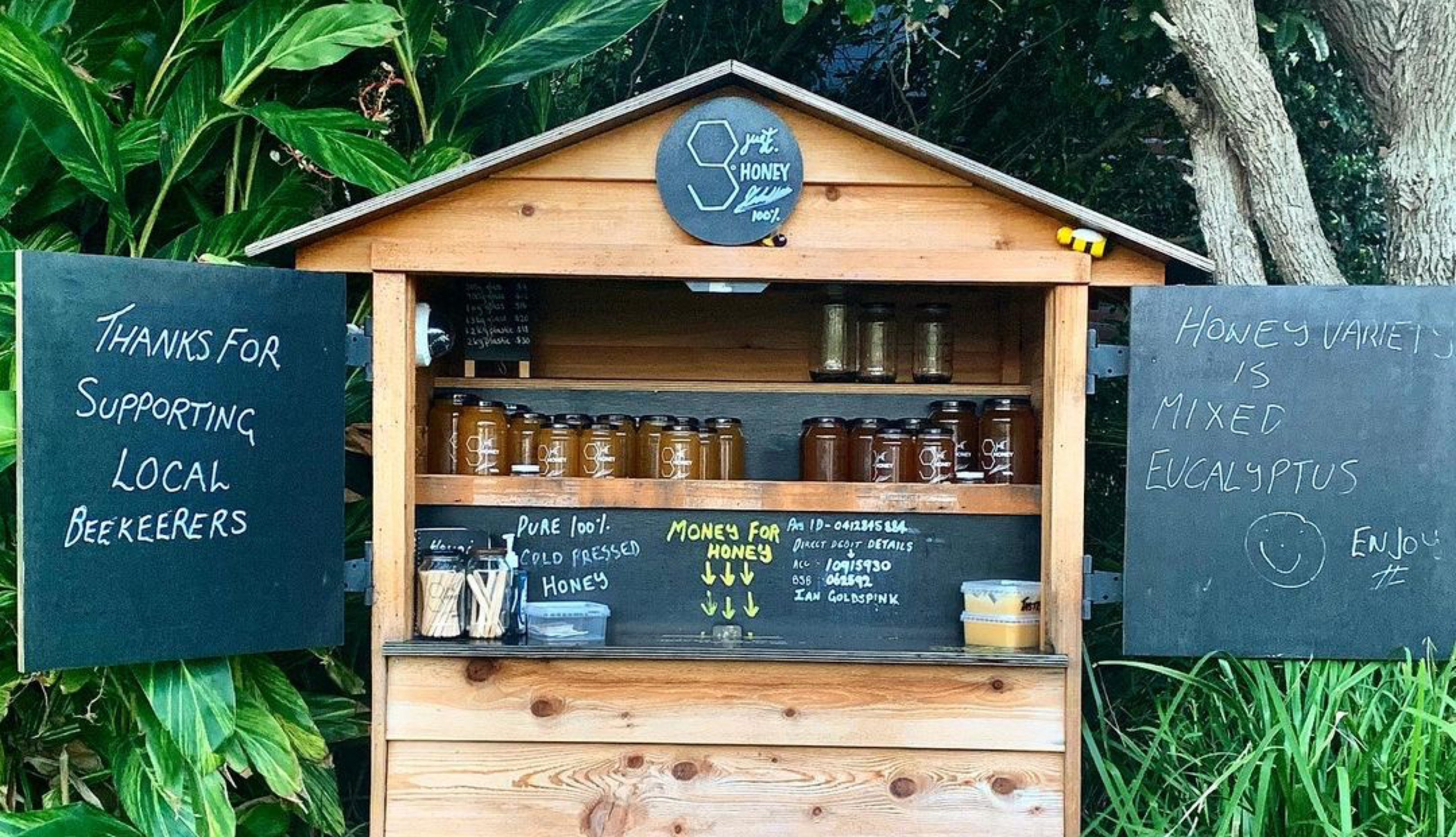
One of the greatest joys of travelling around New Zealand is discovering seasonal produce at farmers’ markets (check out our post on the best New Zealand farmers' markets) and roadside stalls.
Buying food fresh and local is good for the environment. It’s also a great way to learn about regional delicacies while meeting some regular Kiwis. Depending on the time of year, you might be able to pick up:
- Stone fruit in Otago — most prominent in summer
- Apples in Nelson — from summer through to autumn
- Kiwifruit in Te Puke — with an autumn peak season
- Berries in Matakana — another summer fruit that’s picked straight from plant to platter.
Visiting local farmers’ markets
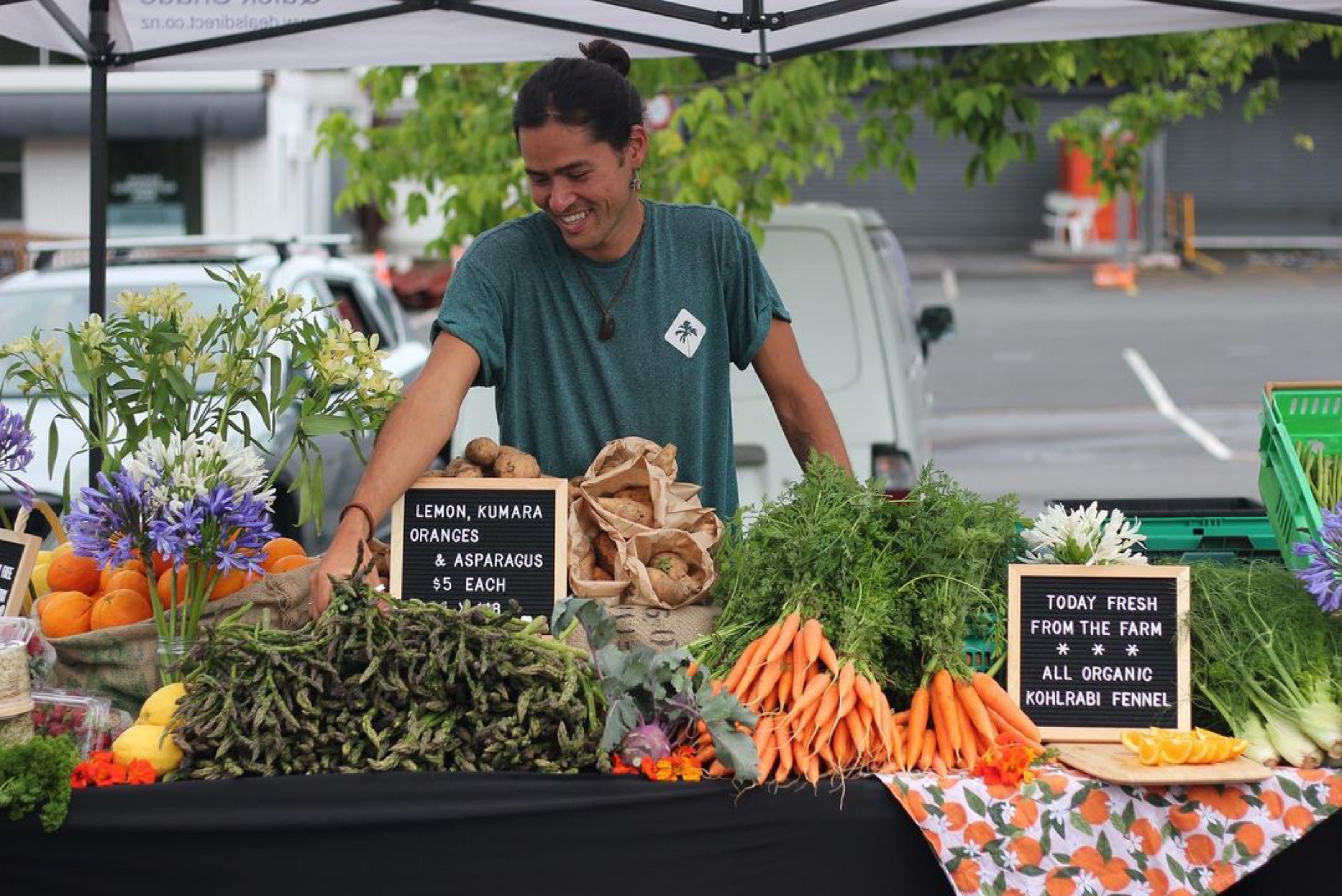
One weekend activity that needs to be on your cooking radar is a visit to a New Zealand farmers’ market.
Most towns have at least one market showcasing the farming wares of local producers. Simply Google the areas you’re planning to travel to or stop at an i-SITE to get details on the nearest markets.
You’ll be able to pick up loads of fresh produce along with tasty treats such as Mānuka honey and locally brewed beer.
With weekend markets and gourmet food sellers in mind, consider leaving some meals unplanned. You could pick up a variety of fresh foods, including seafood, and see where the culinary road takes you.
Check out our five-day foodie road trip itinerary for some roadside produce ideas.
Cooking in a motorhome can be easy
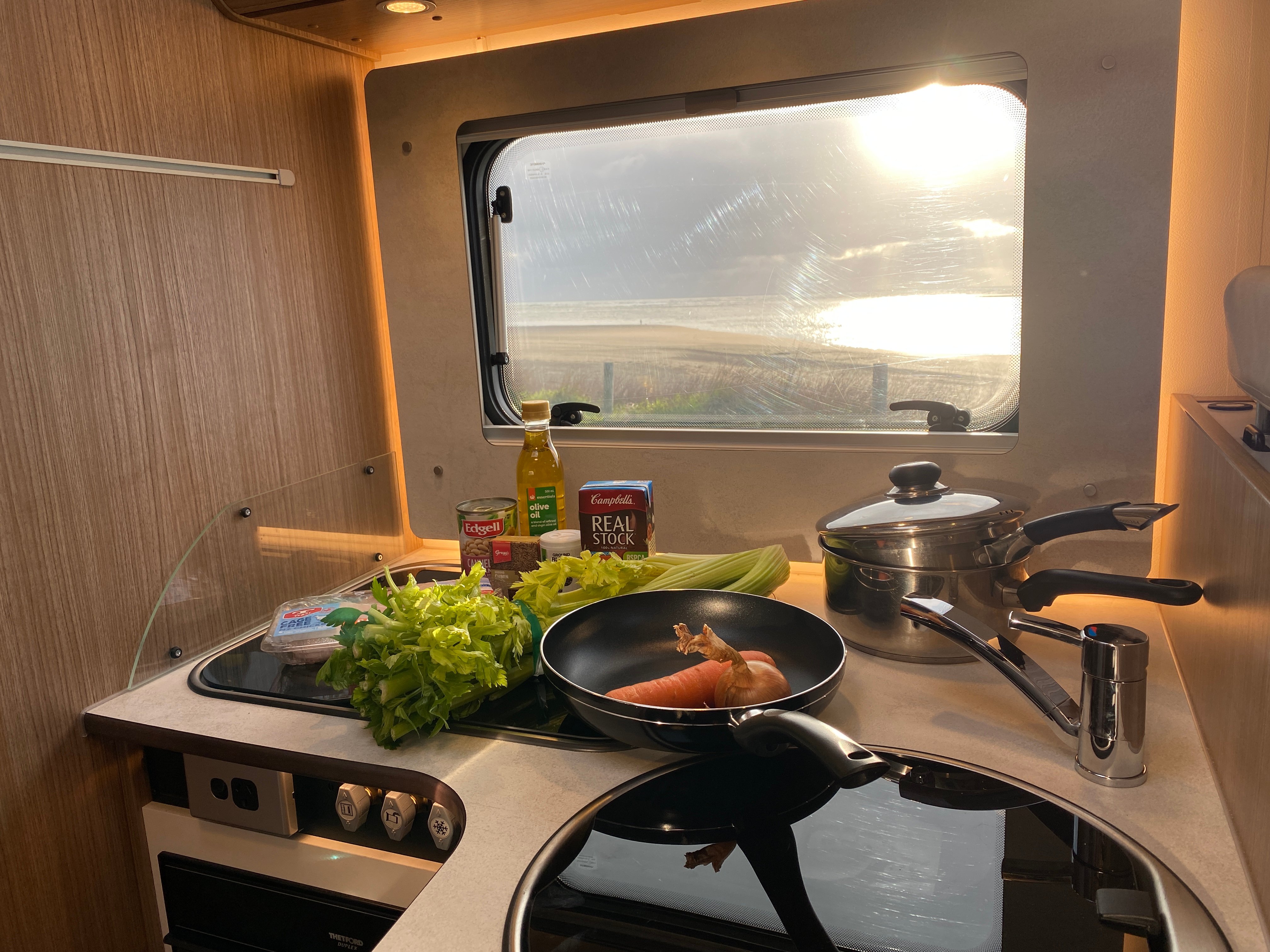
Cooking in your campervan or motorhome is similar to cooking at home — but with a few key differences, such as having:
- A lot less space to store, prepare and cook meals
- Minimal storage for your room temperature food
- Varying fridge capacity in both size and efficiency.
Check the capability of your rental’s fridge and its power sources, especially if you plan to freedom camp without mains power.
Find out about motorhome power so that you can spend more time off-the-grid.
Campervan cooking appliances
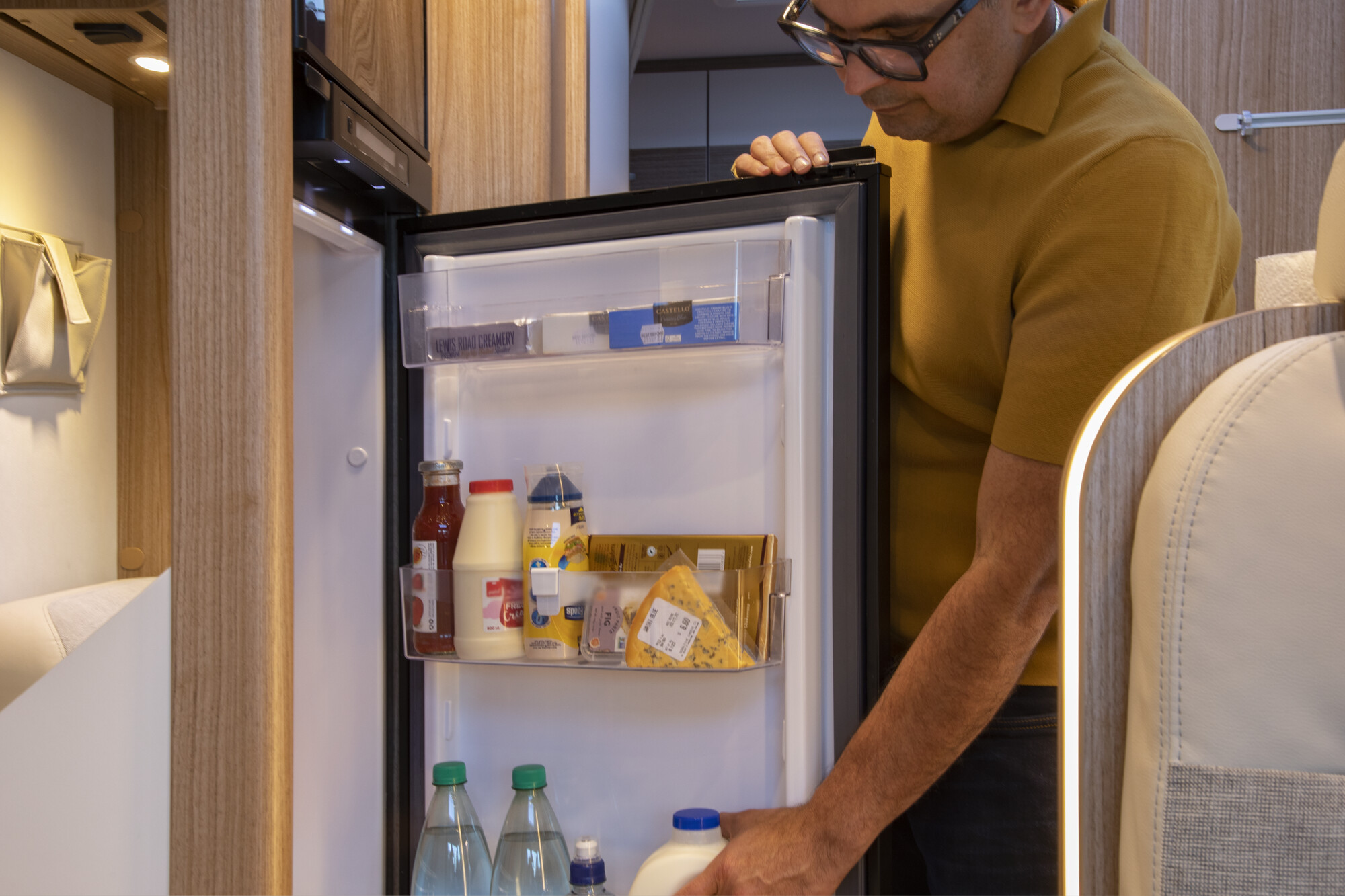
The main cooking appliances you’ll use in a motorhome will be your gas hobs. Usually there are three — so a campervan stove top is smaller than what you have at home.
Meals that can be cooked in one or two pots or pans are real winners when you’re in a motorhome due to the limited space. Think stir fry, risotto and pasta dishes.
Some higher-end motorhomes come with an oven. If yours does, you could include pizza in your meal roster. But note that many oven-based meals (like pies and lasagne) take a lot of time to cook. If you’re off grid, they’ll use up plenty of gas and may even heat up your motorhome — which can be unpleasant in summer.
As with any gas stove top or oven in a motorhome, it’s important to keep a window slightly open while you’re cooking to ensure proper ventilation.
Outdoor cooking
Most European campervans don’t have microwave ovens on board. This is mainly to save space and because you can’t use one when freedom camping without mains power.
However, there’s often a barbecue included or available as an optional extra. Not only is barbecuing a quick and easy way to make dinner, it’s also a way to cook outside amongst nature — particularly when you’re off-the-grid. Try creating:
- A fresh salad with New Zealand beef or lamb steak
- Grilled halloumi cheese and vegetables.
Utilising a barbecue has the added advantage of keeping all the cooking odours outside. Both the smell of your food and the majority of the cooking mess will be outside your motorhome.
Download our free 23 recipes for the road which includes a few barbecue dishes.
Motorhome cooking utensils
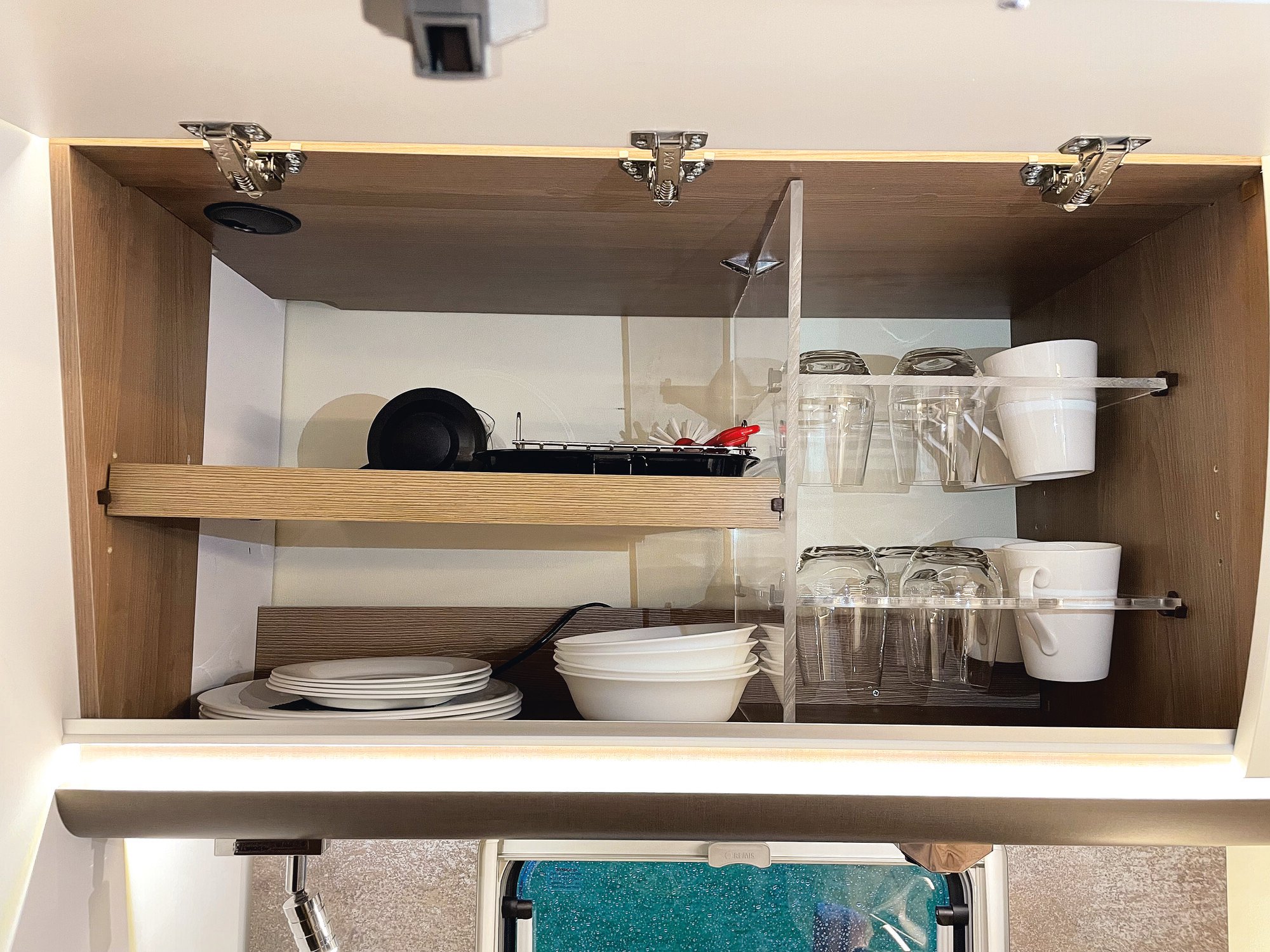
The utensils provided in a campervan hire are few and generally fairly basic. Having said that, premium motorhomes usually have a coffee plunger. You can also expect:
- Cutlery and crockery
- A pan and some pots
- Cups and glasses
- A colander, scissors and a can opener
- Sharpish knives and a grater.
You should be able to check what’s included in your campervan with your rental provider. If you’re a food lover and need specialist equipment to prepare meals, your best bet may be to bring it along with you.
For more information on cooking utensils and appliances, see our guide to cooking in a motorhome kitchen.
Disposing of rubbish, leftovers and grey water
Getting rid of rubbish is easy at campgrounds — but if you’re freedom camping, it can be challenging to find bins for general waste, food scraps and recycling. Have a plan for storing your waste and recycling inside your motorhome (or its external lockers) until you find rubbish and recycling bins.
Planning for leftovers
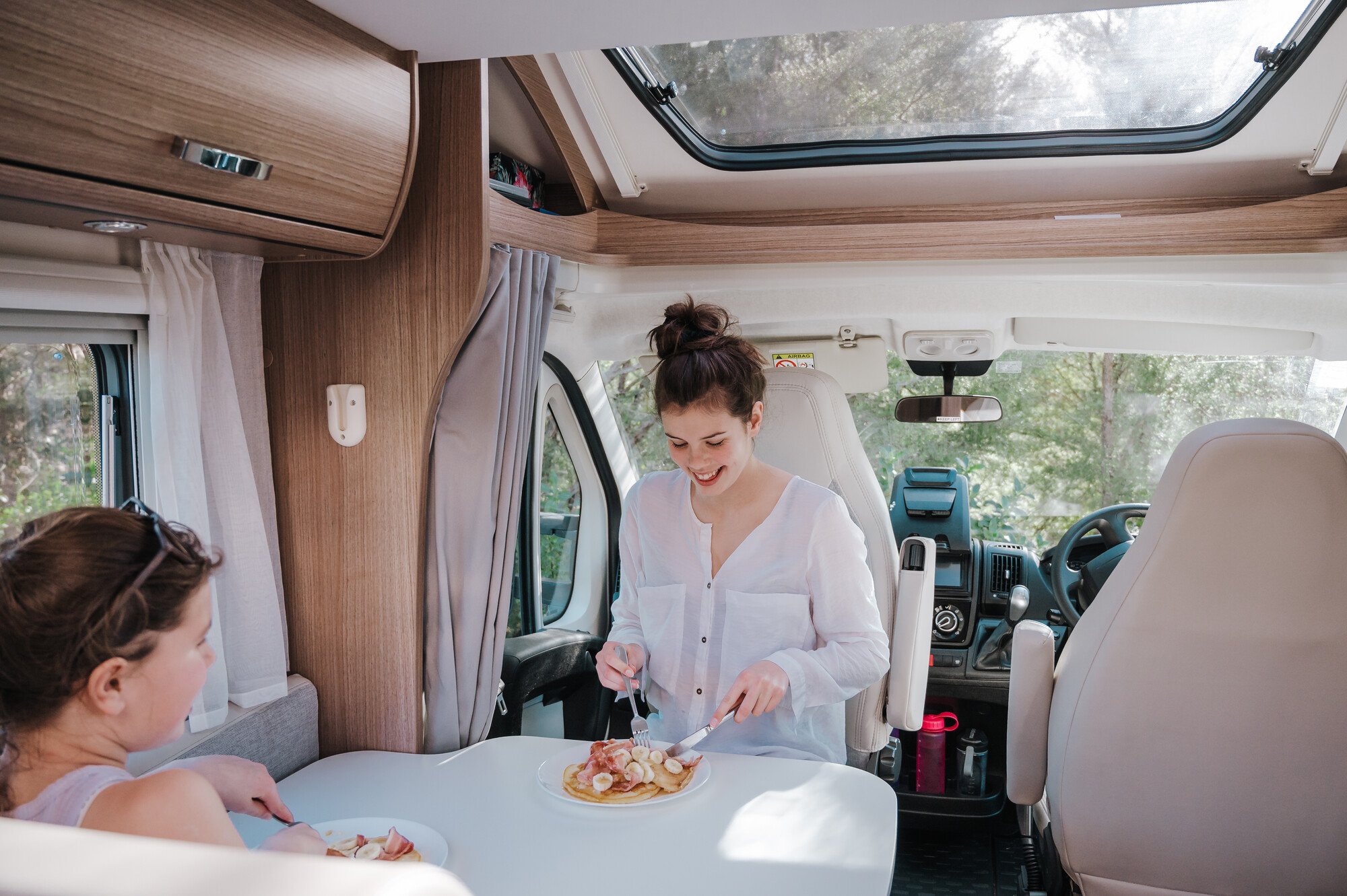
The best advice around planning for leftovers is to not have any leftovers. Of course, that’s probably not realistic, so aim to:
- Minimise waste and leftovers by cooking smaller meals and portions
- Bring a couple of small food containers with you to store any remains in the fridge
- Plan an additional meal that makes use of your expected leftovers.
A few ideas for meal combos include steak for dinner followed by meat and salad wraps the next day. Or a leftover pasta bolognese sauce turned into a nacho meal with beans, corn chips, sour cream and avocados.
Remember that you’ll need to empty the fridge before returning your motorhome.
Managing fresh and grey water
Using fresh water and disposing of grey or dirty water is very different in a motorhome than it is at home. Your campervan will have a limited supply of fresh water so it’s important to:
- Keep an eye on your motorhome’s water levels — to ensure you don’t unexpectedly run out
- Be careful how much water you use with each task.
To check your water tank’s level, press the fresh water tank monitor button on your campervan’s control panel.
|
💡Fresh water cooking tips
|
Your grey water tank will need to be emptied at a designated campervan dump station — which can be found at most campgrounds. There are also public dump stations in many towns.
Find out how to manage your fresh and grey water.
Keep your campervan cooking simple
With minimal kitchen storage plus only basic appliances and utensils, it’s a smart idea to stick to simple yet nutritious meals. You’ll probably want to spend less time cooking on the road and more time exploring anyway.
With a little planning and preparation, you can have most of your meals sorted before you even hit the road. Just keep a few nights free for enjoying all the fresh local produce you’ll come across while holidaying in your recreational vehicle.
For more inspiration and easy meal ideas download our free 23 recipes for the road.

